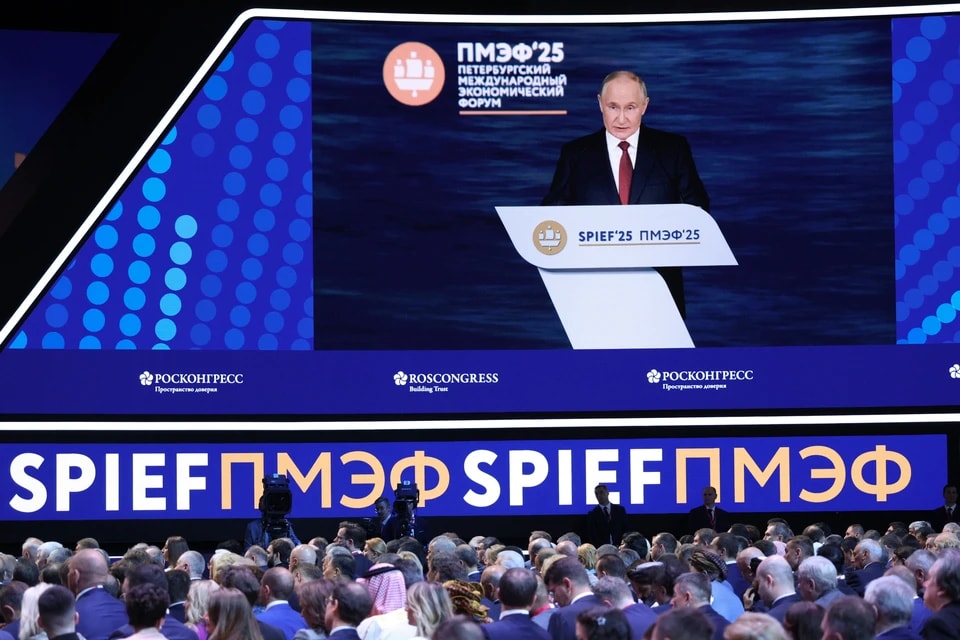Third Day of SPIEF 2025: Global Dialogue and Innovation

The third day of the St. Petersburg International Economic Forum (SPIEF) marked the culmination of its business agenda, gathering over 20,000 participants from 140 countries under the theme 'Shared Values as the Foundation for Growth in a Multipolar World.'
Plenary Session and Key Speeches
The third day of SPIEF 2025 featured a four-hour plenary session, a record in recent years. Russian President Vladimir Putin delivered a 55-minute speech, outlining five key steps for transforming the economy: increasing economic activity among citizens, improving the investment climate, embracing technological renewal, expanding foreign trade, and integrating defense innovations into the civilian economy.
The session included remarks from Indonesian President Prabowo Subianto, Chinese Vice Premier Ding Xuexiang, Bahrain's National Security Advisor Sheikh Nasser bin Hamad Al Khalifa, and South African Vice President Paul Shipokosa Mashatile.
Sky News Arabia journalist Nadim Koteich moderated discussions on global economic challenges and technological sovereignty. President Putin addressed questions about BRICS cooperation and the evolving landscape of international trade, emphasizing the importance of forming new alliances.
Business Dialogues and Technology Showcase
The business program included sessions on digital transformation, sustainable development, and human capital. A key panel, 'Shaping a New Platform for Global Growth,' set the tone for rethinking economic strategies in a multipolar world.
At the SPIEF Investment & Business Expo, major Russian companies showcased advancements in AI, robotics, and nuclear power. Rosatom unveiled its modular nuclear reactors designed to bring power to remote regions and for export to the Global South. One highlight was the robot “Volodya,” which performed a traditional Lezginka dance during a press dinner, symbolizing Russia’s progress in robotics.
International Cooperation
SPIEF 2025 hosted delegations from China, India, Turkey, Iran, the UAE, and numerous African nations, including Burkina Faso and the Central African Republic. Bahrain, as the guest country, played a key role in strengthening economic ties with Russia. Agreements were signed in energy, IT, and infrastructure sectors, enhancing collaboration with BRICS and the Global South.
Italian business representatives, supported by the Exploring Eurasia association, participated in various events including the opening of an Italian cuisine restaurant—underscoring ongoing cultural and business dialogue between Russia and Europe. “This session was key,” remarked Juan A. de Castro de Arespacochaga, professor at Complutense University of Madrid. “We engaged in an open dialogue about the future—critical for Russia, BRICS, and the global majority.”
Retrospective
SPIEF has traditionally served as a global dialogue platform. In 2023, the forum attracted 17,000 participants. By 2024, agreements worth 6.4 trillion rubles were signed. The 2025 edition shifted focus to developing nations, aligning with evolving geopolitical dynamics. While events like Davos remain influential, SPIEF’s emphasis on BRICS and the Global South positions it as a unique and strategic forum.
Conclusions and Forecast
The third day of SPIEF 2025 solidified Russia’s role as a leader in a multipolar global landscape. Agreements and technology demonstrations highlighted the country’s growing potential in exporting IT and energy solutions.
The forum underscored a shift toward new economic alliances, especially with Asia and Africa. SPIEF may evolve into a central platform for BRICS countries, with technologies showcased finding global application. Preliminary figures estimate up to 7.5 trillion rubles in contracts signed, enhancing Russia’s international economic influence.









































